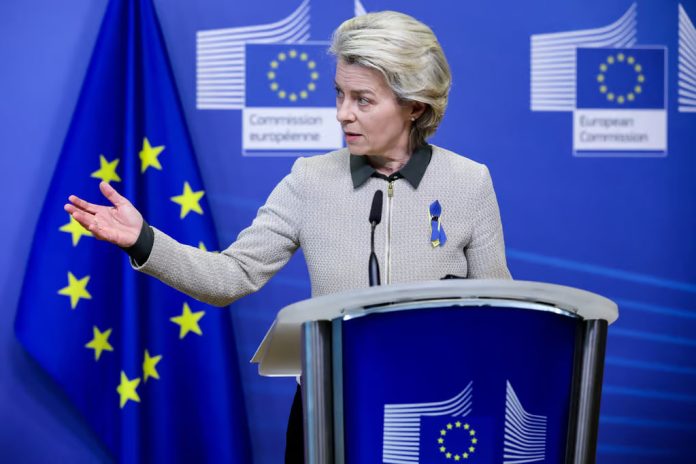European Commission President Ursula von der Leyen is expected to unveil proposals on Wednesday to change the way the EU admits new members, Politico reports.
EU leaders have been hesitant to discuss the admission of new members publicly, as angry farmers continue to protest across Europe. Protesters argue they are losing competition against cheap imports, most of which come from Ukraine. They also claim they are worried about spiralling fuel prices, as well as environmental regulations planned by the EU.
Therefore, for the moment, member states are making concessions to appease angry farmers. EU countries agreed on Monday evening to impose restrictions on the sale of Ukrainian agricultural products, dealing a significant blow to the war-torn country’s exports.
Meanwhile, European leaders are minimising talk of enlargement, especially with EU elections just three months ahead. Some EU officials told Politico that they preferred to keep secret the work being done to prepare for the possible integration of Ukraine, Moldova and several Western Balkan countries, especially the implications of that integration for farmers.
“Let’s be honest: nobody wants to talk about this [enlargement] before the European elections. Talking about less subsidies for European farmers is not something you’d want to put on your campaign slogans.”
European Commission President Ursula von der Leyen, who is running for a second term, however, has promised to prepare the EU to welcome Ukraine. The war-ravaged country would become the largest territory in the bloc, with Kyiv likely to wield considerable influence in the European Parliament and the Council.
It is time for Europe to once again think big and write our own destiny.
Ukraine would have one of the lowest GDPs, putting a huge strain on funding that flows from richer regions to poorer ones. Ukraine’s integration into the bloc could mean about 186 billion euros of EU funds flowing into the country over seven years, according to an internal note from the Council of the EU.
The bloc decided that preparations for the eventual integration of Ukraine, Moldova, Georgia and the six Western Balkan countries should be made internally, not in the public eye.
However, Kai-Olaf Lang of the German Institute for International and Security Affairs stated that the admission of new members to the EU would be impossible without intra-European reforms.
When European leaders meet this week to discuss pressing issues at their summit, they are likely to barely touch the topic of enlargement. The Commission was supposed to publish a communication on reform ahead of enlargement in late February, but the draft was heavily watered down, three other EU officials claimed.
The communication is now due to be published on Wednesday, the day after European affairs ministers were expected to discuss it.
Hungary blocked talk of EU support for Ukraine in exchange for unfreezing funds. Only when Prime Minister Viktor Orbán left the hall during the December EU Council session, 26 other leaders were able to act on the initial accession steps for Ukraine.
Some countries are losing patience with calls to step up enlargement, especially after the Commission’s move in March to open the bloc to potential new members such as Bosnia and Herzegovina. Tiago Antunes, the Portuguese secretary of state for European affairs, whose country has been pushing for intra-EU reform, stated:
“Enlargement and internal reform processes must go hand in hand. We are indeed awaiting this communication from the Commission and we have great expectations. It is much-needed to discuss the reforms that are needed to prepare for the new member states to join the Union.”
However, diplomats and officials argued that the real debate should take place after the European elections. At the end of June, European leaders will sign the so-called strategic agenda for the next European Commission, including intra-European reform.
Poland, which will assume the rotating presidency of the EU Council in 2025, is expected to launch the groundwork for the enlargement.
We have time. It’s not that Ukraine is joining the EU tomorrow.
